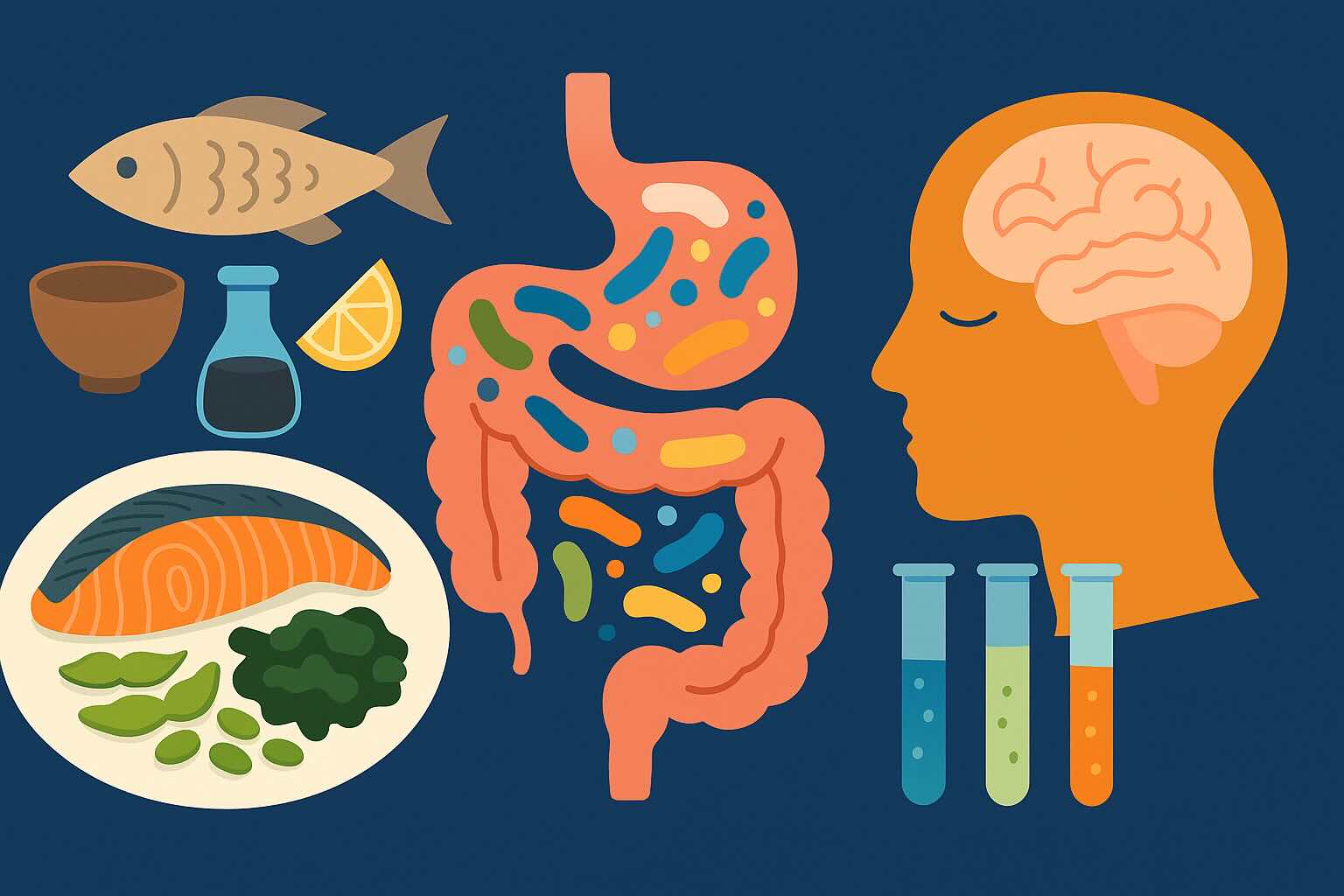The Gut Check: June 28, 2025
Welcome to this week’s Gut Check, your Friday roundup of the freshest microbiome discoveries that connect the dots between gut science, mental health, resilience, and emotional healing. These stories go beyond digestion to explore how what’s happening in your belly shapes your entire being—body, brain, and spirit.
Eat Like the Japanese, Feel Less Blue
A new study out of Japan found that people who follow the traditional washoku diet—a pattern rich in vegetables, fermented foods, seaweed, and fish—had a 17 to 20 percent lower risk of depression. This dietary style isn’t just flavorful and rooted in cultural tradition, it’s packed with fiber, omega-3s, and natural probiotics that support gut and brain health alike.
Researchers noted that the synergy of whole foods in washoku appears to modulate inflammation and support microbial diversity, two keys to emotional balance and mental resilience. Participants following this pattern reported fewer symptoms of anxiety and depression and better overall well-being compared to those eating more processed Western-style diets.
This finding encourages us to think of food as more than fuel. A deeply rooted, minimally processed, and culturally meaningful diet may quietly nurture our inner terrain and uplift our mood in the process. Dive into the study
Nitrogen Metabolism and the GABA Connection
A recent study revealed a fascinating link between gut bacterial metabolism and emotional regulation. Scientists found that certain microbes, including Streptococcus thermophilus, help process nitrogen in a way that increases GABA production—a neurotransmitter associated with calm, stress relief, and resilience.
In mouse models, boosting this microbial activity led to reduced anxiety-like behavior and improved stress responses. The mechanism appears to involve regulating ammonia levels in the gut, which supports a stable internal environment and promotes the synthesis of calming neurochemicals like GABA.
These findings open the door to future probiotics or dietary strategies that specifically enhance these mood-balancing pathways. It’s another reminder that what happens in your gut doesn’t stay in your gut—it’s part of a whole-body system that speaks the language of chemistry, mood, and balance. Read more
Gut-Brain Axis and Early Mental Development
A comprehensive review in Molecular Neurobiology explored how the gut-brain axis affects mental health not just in adults, but from infancy through adolescence. Researchers traced links between early gut microbial imbalances and later-life risks of anxiety, ADHD, and even autism spectrum disorders.
The gut microbiome appears to be deeply intertwined with early brain development. Microbial diversity in the first few years of life shapes immune function, neural connectivity, and even how the body reacts to stress. These early-life changes may set the tone for mental resilience or vulnerability in the decades to come.
For parents, caregivers, and anyone interested in lifelong wellness, this is a powerful reminder: nurturing the gut early in life may be one of the most loving and forward-thinking things we can do. Explore the review
Sudachi Peel Extract Fights Stress in Mice
In a creative experiment, researchers gave stressed-out mice a supplement made from sudachi peel—a Japanese citrus fruit known for its strong antioxidant properties. The results were striking. The mice receiving the extract showed less emotional numbness, lower levels of inflammatory cytokines, and better gut barrier function than their untreated peers.
This study adds weight to the idea that plants—particularly those with antioxidant and polyphenol-rich profiles—may offer direct support to the gut-brain axis. The sudachi supplement appeared to modulate the immune system and improve microbial balance in ways that showed up behaviorally and biologically.
While more research is needed to confirm the same effects in humans, this is an exciting signpost pointing toward plant-based, integrative strategies for emotional well-being and stress resilience. Read the abstract
Modeling How Microbes Talk to Your Brain
A new preprint study from arXiv used mathematical modeling to simulate how short-chain fatty acids (SCFAs)—those gut-made byproducts from fiber fermentation—signal to the brain. These models help visualize how SCFAs trigger vagus nerve responses and influence brain areas linked to mood and decision-making.
While we’ve long known that SCFAs like butyrate and acetate support brain health, this modeling work helps clarify the exact biological sequence. It’s like translating gut-brain Morse code into a language we can map and, one day, perhaps manipulate therapeutically.
These insights help lay the groundwork for next-gen psychobiotics: targeted probiotics or food strategies designed to send specific emotional or neurological signals from the gut up to the brain. Check out the preprint
That’s Your Weekly Gut Chat
This week’s roundup blends science and soul—reminding us that emotional and spiritual well-being are not separate from biology. They emerge from it, evolve with it, and respond to how we nourish our inner ecosystems.
Whether it’s the food on your plate, the microbes in your belly, or the plants that brighten your pantry, everything is connected in the terrain within. See you next week, with more discoveries worth digesting.




0 Comments